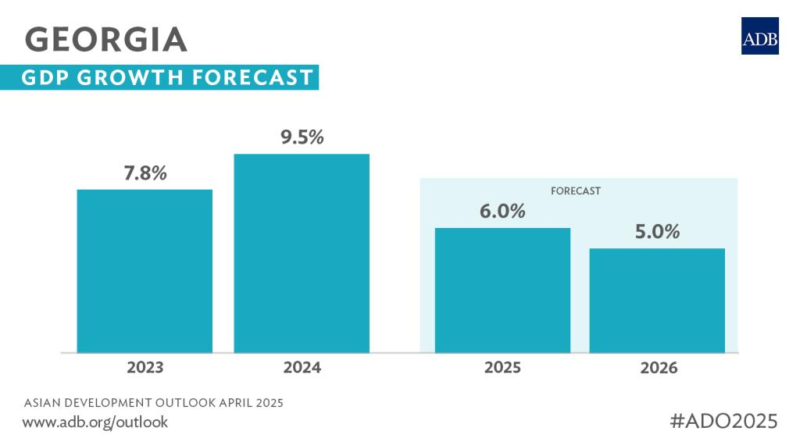Georgian Economy to Grow at 6% this Year, 5% in 2026 — ADB
TBILISI, GEORGIA (9 April 2025) — The Georgian economy is expected to grow steadily in 2025 amid global uncertainties and geopolitical risks and can expand further through developing green connectivity and energy networks, according to a new Asian Development Bank (ADB) report.
The Asian Development Outlook (ADO) April 2025, ADB’s flagship annual economic publication, forecasts Georgia’s gross domestic product (GDP) to grow by 6.0% in 2025. Growth is expected to ease to 5.0% in 2026, as services and inward money transfers are expected to slow.
The growth forecasts were finalized prior to the 2 April announcement of new tariffs by the US administration, so the baseline projections only reflect tariffs that were in place previously. However, ADO April 2025 does feature an analysis of how higher tariffs may affect growth in Asia and the Pacific.
“Georgia’s economic growth prospects are steady,” said ADB Country Director for Georgia Lesley Bearman Lahm. “To enhance its growth potential, Georgia should capitalize on its regional positioning and harness the country’s transit and energy potential. Further developing its transport and logistics infrastructure, digital services, and tapping into its renewable energy resources could create significant economic opportunities.”
Inflation is projected to accelerate to 4.0% in 2025 and then ease toward the central bank’s 3.0% target in 2026 as growth slows. The current account deficit is expected to widen in 2025 and 2026 as foreign finance inflows may slow due to global markets uncertainty affecting key trade partners.
ADO April 2025 forecasts agriculture growth to increase by 3.9% in 2025 on the back of improved infrastructure and more sustainable crop practices, before slowing to 2.8% in 2026. Industry expansion, meanwhile, is projected to decrease to 4.6% in 2025 and 3.1% in 2026, reflecting slower growth in construction.
Raw materials and vehicle reexports will remain the leading items in Georgia’s merchandise exports. Growth in service exports is projected to slow further to 12.8% in 2025 and recover to 13.2% in 2026, while net money transfers is seen to decline by a further 10% to 15% but remain significantly above pre-2022 levels. External public debt is expected to decline to 25.0% of GDP in 2025 and 24.5% in 2026.
Georgia has benefited from its strategic location and rapidly increasing transit activity and can benefit further from deeper integration with advanced economies, particularly in the European Union (EU) and Asia. Continued investment in sustainable transport, renewable energy, and digital services will help Georgia improve its infrastructure quality, expand its outreach, and reduce its carbon footprint while enhancing its regional security. Strengthening partnerships with international financial institutions, the EU, and Central Asian countries will be essential in positioning Georgia as a cost-effective transit route for energy resources.


